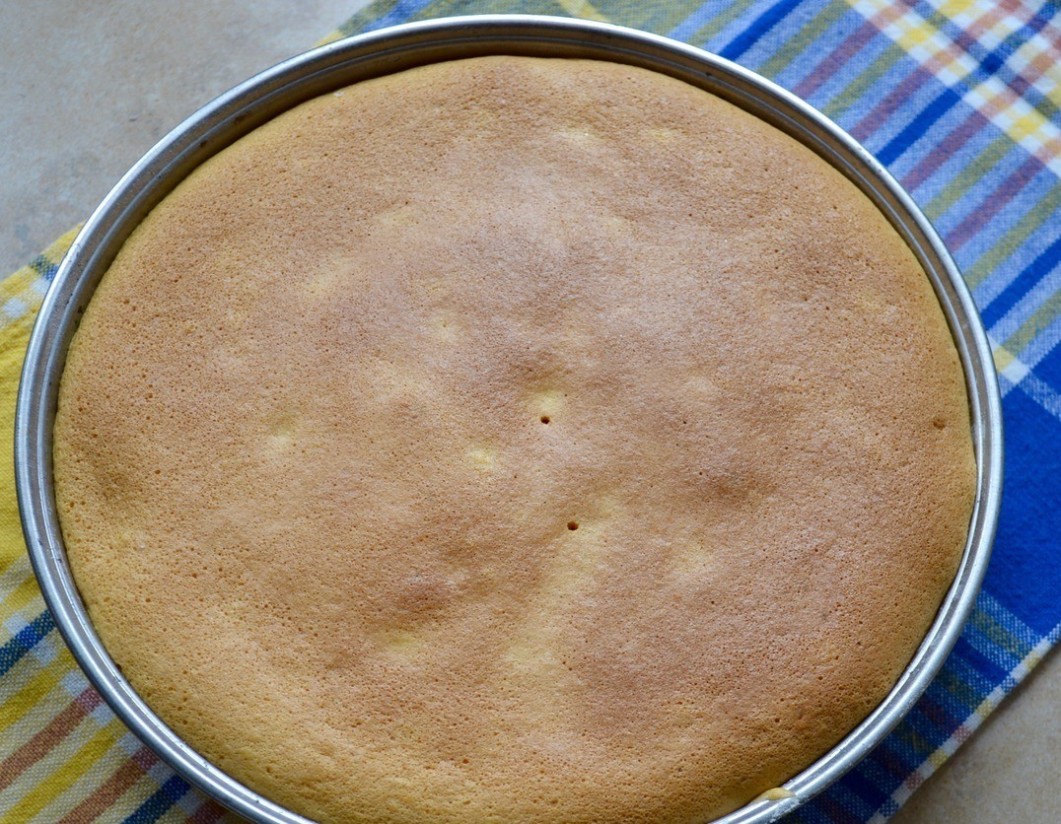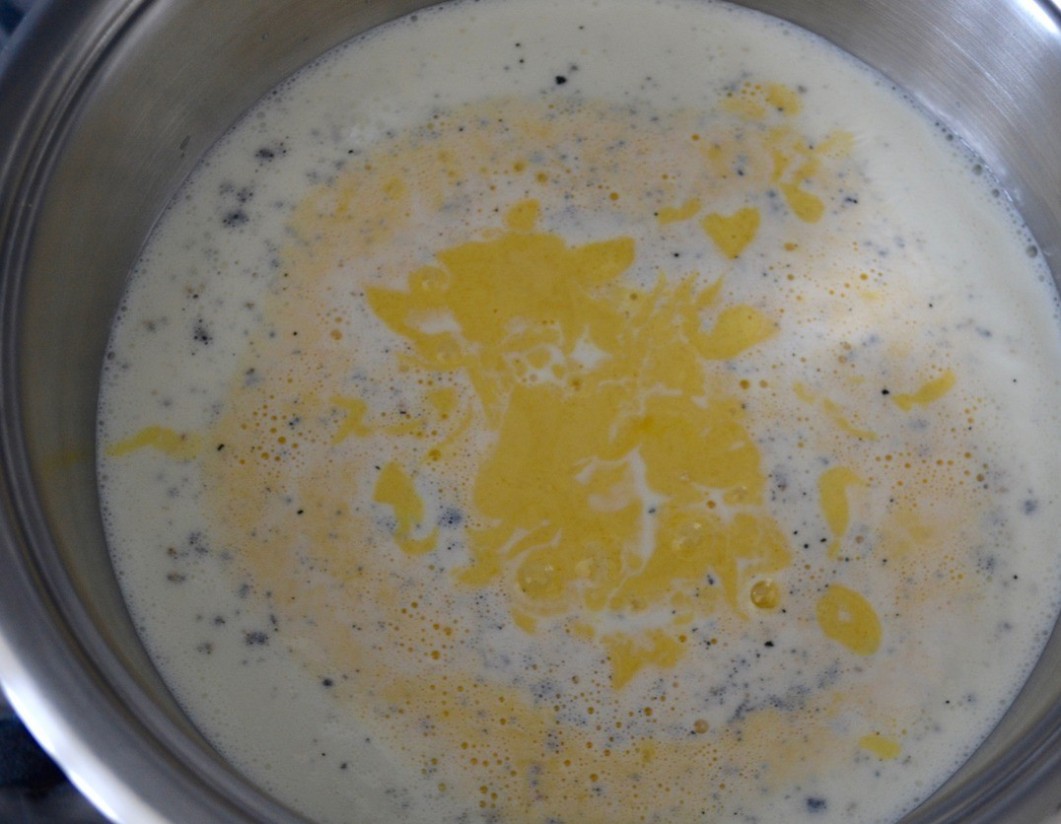
Ingredients for - Italian Mimosa Cake
How to cook deliciously - Italian Mimosa Cake
1. Stage
Break 4 eggs into the bowl of a food processor (or simply into a large bowl if you will be using a hand mixer to beat them). Each egg should be beaten into a glass and only then added to the other eggs. Use this method always when working with eggs in cooking, but for me this rule is especially true when using large quantities of eggs! This little rule will help you avoid unnecessary trouble.

2. Stage
Add the sugar and start beating the egg mixture until it doubles in volume, about 10 minutes at high speed. Meanwhile, separate out the 8 yolks we need. After 10 minutes, start adding the yolks, continuing to beat the egg mixture (while adding the yolks, you can slightly reduce the speed of the mixer, and then continue beating at high speed again). As a result, we get a fluffy and airy egg mixture. It has increased in volume by about 3-4 times.

3. Stage
While the eggs are being beaten, sift the flour and starch a couple of times (I sift once in a bowl and a second time directly into the bowl with the eggs). Introduce the flour mixture into the egg mixture in batches, mixing very gently each time with smooth swirling motions from bottom to top, saturating the dough with additional air. Do not mix for a long time, so that the eggs do not settle, just until you get a smooth dough structure, without lumps.

4. Stage
Prepare 2 biscuit tins 22-24 cm in diameter. Grease them with butter and lightly dust them with flour. Spread the dough evenly into the 2 forms. One biscuit will become the cake itself, and the second we will use to decorate the surface of the cake with delicate pieces of biscuit...

5. Stage
Bake the biscuits in a preheated 180 degree oven for about 30 minutes. Check the readiness of the biscuits with a wooden skewer and, in any case, watch your oven. Turn the finished biscuits over and cool on a rack. It is best to let the biscuits "rest" overnight, or at least 5-6 hours.

6. Stage
Meanwhile, prepare the custard Patissiere (unlike our usual custard, we use only egg yolks). In a saucepan with a thick bottom pour the milk and 300 ml (!) of cream. Add the seeds from the vanilla pod (in a pinch, you can substitute vanilla extract). Place on the heat, but do not bring it to the boil.

7. Stage
Separately, in a bowl, mash the egg yolks with the sugar. Add the flour and stir everything until smooth. When the milk mixture is just beginning to boil, add the yolks to it. Do not stir under any circumstances! The yolks will rise to the surface of the milk (as pictured). Allow the mixture to reach the point where the milk begins to boil, which means the milk will begin to "bubble" between the walls of the pan and the eggs, and small volcanoes will form in the center.

8. Stage
At this point, use a whisk to stir in the egg yolks and milk until smooth. The cream is ready! It should be smooth and without lumps. I have offered you in this recipe the so-called express method of making the cream, offered by the Italian confectioner Luca Montersino... You can, however, make the cream the old-fashioned way, the familiar way! ))

9. Stage
Transfer the finished cream to a wide container and cool, covering with clingfilm in contact with the surface of the cream, so that no crust is formed on the cream.

10. Stage
When the cream has cooled, whip the remaining cream (200 ml) with the powdered sugar. Transfer the cream to a large bowl. Set aside just 3 tablespoons of cream, and add the remaining cream in batches to the Patissiere cream, stirring gently each time so that the cream does not settle. Place the ready cream in the refrigerator.

11. Stage
Prepare the biscuits. Carefully cut the first biscuit into three equal layers. This is how bright and yellow it is because of the large amount of yolks used, and no extra coloring! ))

12. Stage
Free the second biscuit from the top crust, and then cut into strips and at the end into small squares (the smaller the better). The biscuits are very tender and fluffy in texture. (This time the kids and I tore the biscuit into little pieces...)

13. Stage
Prepare the liqueur soak. Heat water in a small saucepan, add sugar and liqueur (preferably orange, like Cointreau). Stir well until the sugar has dissolved (don't overheat!), remove from the heat, and allow to cool. Now begin assembling the cake. Place the first cake on a plate and moisten it liberally with the cake.

14. Stage
Then apply a thin layer of cream - 1/2 the amount of cream set aside, and properly distribute it over the surface of the crust.

15. Stage
Visually divide the cream into three parts. Spread a layer of cream on the first crust.

16. Stage
Cover with the second cake. The second cake also soaked first with liquor, then smeared with the remaining cream and covered with a layer of cream. On top - the third and last layer. The remaining cream should be smeared on the top and sides of the cake.

17. Stage
Finally, decorate the top of the cake with sliced biscuit slices, laying them out on the cake. They will adhere perfectly to the surface of the cake on the cream. Put the cake in the refrigerator overnight and you can serve it the next day!












